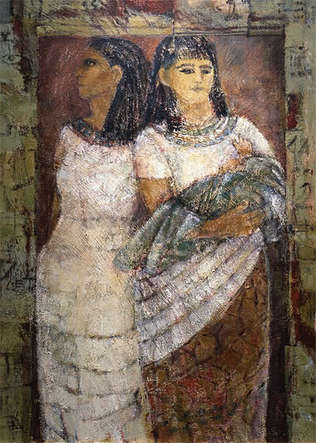
“The king of Egypt said to the Hebrew midwives … “When you are helping the Hebrew women during childbirth on the delivery stool, if you see that the baby is a boy, kill him; but if it is a girl, let her live.” The midwives, however, feared God and did not do what the king of Egypt had told them to do; they let the boys live” (Exodus 1:15-17).
Because the two women placed their fear of God before their fear of the Egyptian king, Jewish tradition presumed that they were Hebrew-born women, but the traditions disagree. While one links Puah with Miriam, Moses’ sister, and Shiprah with Jochebed, the mother of Moses, another tradition viewed the women as Jewish proselytes who were not related to Moses at all.
The fact that they are said to be “Hebrew midwives” could mean that they were Hebrew or that they were “midwives to the Hebrews.” The names of the two women also seem to reflect underlying Egyptian names, and it is possible that they were indeed Egyptian converts. This possibility seems all the more likely as we continue to read the story:
“Then the king of Egypt summoned the midwives and asked them, “Why have you done this? Why have you let the boys live?” The midwives answered Pharaoh, “Hebrew women are not like Egyptian women; they are vigorous and give birth before the midwives arrive.” So God was kind to the midwives and the people increased and became even more numerous. And because the midwives feared God, he gave them families of their own" (Exodus 1:18-21).
The fact that Puah and Shiprah could contrast Hebrew with Egyptian births suggests that they may have acted as midwives for both, and their excuse would be all the more believable if that were the case. The ancient Jewish historian, Iben Ezra, states that the two women were in charge of “more than 500” midwives; if this was true, the women were likely appointed by the Egyptian government and would almost certainly have been Egyptian women.
In any event, these women acted with faithfulness to the law of God and demonstrated a measure of faith in doing so. It is clear that their faith was rewarded. We are told not only that “God was kind to the midwives” in the sense that they were spared the anger of the Egyptian king, but also we are told “the people increased…” (vs. 20), and “…because the midwives feared God, he gave them families of their own” (vs. 21).
This last blessing may have been a particularly kind one, as scholars believe that midwives in that era were often women who could not have children of their own. In the Hebrew of the Old Testament the expression “families” is literally “houses,” however, and Jewish tradition has it that these were “distinguished” houses from which many Hebrew civil and religious leaders descended.
Whatever the case regarding the various traditions about them, it is clear that God did bless the two chief midwives, and the positive outcome of the story should not obscure the extent of their faith and faithfulness.
Historically, this is the earliest known example of civil disobedience in the face of a specific command by a powerful regime to disobey the law of God. Even today it remains as a wonderful example of the power of faith in difficult circumstances. The two courageous women did what they could to protect themselves, yet their faith in God was ultimately their protection and blessing.



 RSS Feed
RSS Feed
